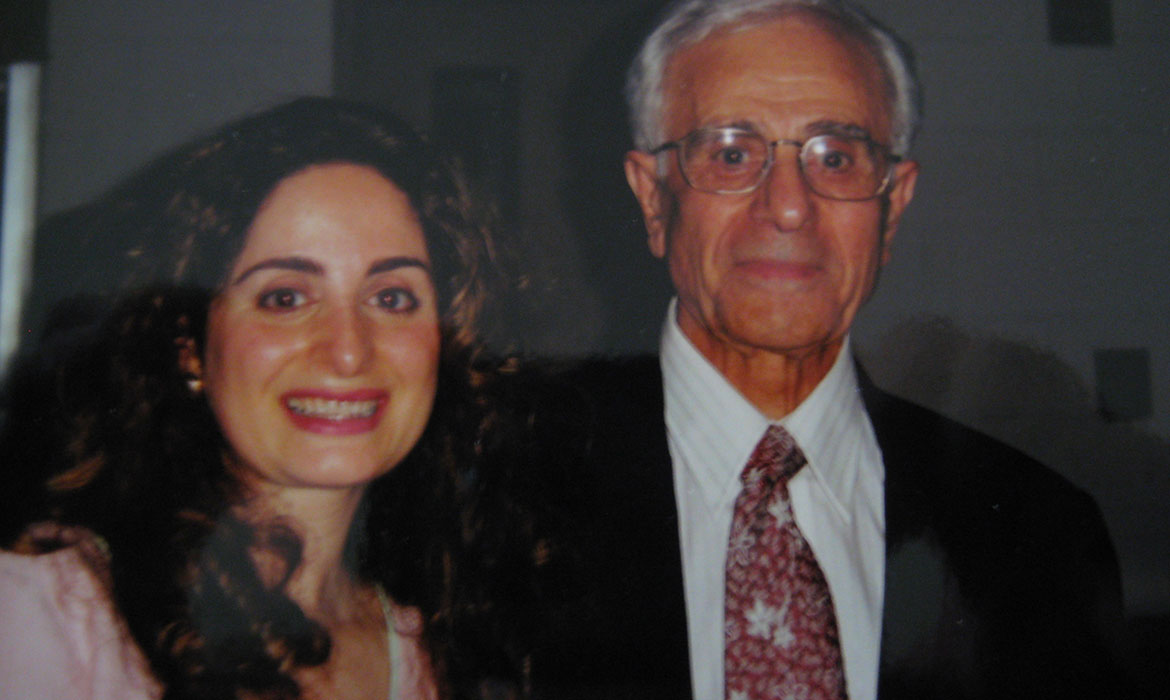My father passed away last year. I think of him constantly, his enveloping smile, his unqualified acceptance, his understanding. What he taught me by example still shapes my life.
Father’s humor was legendary amongst those who knew him. I could never win an argument with him because halfway through the tension and offense of the moment he would make me laugh. I learned to laugh from him, to laugh at my own absurdities and insufficiencies. My world is so much more glorious because of it.
My Dad never stopped learning. After he retired from medicine and running a hospital, he moved to the United States to live with us. The idleness of retirement was not for him, so he began to teach himself how to cook. Soon he was preparing mouthwatering meals worthy of a trained chef. You have to understand, when we were growing up Baba (Papa in Persian) rarely entered the kitchen. He was accustomed to having help. I remember as a child, one day he went to the kitchen to fetch a knife. He did not know which drawer to look in. He wasn’t merely ignorant; he was truly clueless when he started. Yet he persisted until he became one of the best cooks I have ever known.

Another hobby he began after retirement was sewing. One day, he took one of his jackets apart to see how it was put together. “I can make this,” he declared. And he did! He started making suits, leather jackets, shirts, even dresses for me. He loved the process of creativity, and he did not allow ignorance to stop him. Baba was learning new things well into his eighties. He did not allow his age to determine the course of his life. As I settle into middle age in a culture that adores youth, I find this a great comfort. If you are teachable, life gets better after youth fritters away.
Over the years, Baba experienced several major losses. Instead of being stuck in anxiety and blame, he chose to enjoy the simple pleasures of every day, to relish the small moments that most of us pass by. Baba lived life to the full in spite of the kind of heartbreak that would bring others to their knees. Instead of focusing on his disappointment and pain, he focused on the delightful gifts that God had given him. He taught me that even when your world shatters at your feet in a hundred pieces, you can find and savor beautiful blessings.
Baba spoke fluent French and had a knack for mathematics, as well as literature. He was trained as a physician and served as a general in the army of the Shah. The list of his accomplishments was taller than a sycamore tree. And not once would he tell you any of this. He was one of the humblest people I know. He was more interested in whether you enjoyed his latest meal than if you were impressed by his pedigree. In a world where the outward trappings seem so important, his example anchors me to what is real and true. My value is not in what I accomplish.

The last two years of his life, my dad grew weak. He began to lose the physical strength he needed to do the things he loved. Then dementia started to take its toll. He once said it was like watching a light go out, the way he could feel parts of his brain shutting down, falling into darkness. He had to leave the comfort and familiarity of home and move to a nursing care facility. In the throes of those difficult months, he almost never complained. Not when he was in pain, not when he suffered physically, not when he lost the simple dignities we all treasure. I wished I could say that I have learned that lesson, but I have a long way to go.
I learned from Baba that it is never too late to change, to choose the greatest good. To find true life. Although born a Muslim, my father was nominal in his faith. He believed in a Creator God, but I think for the most part, he was a humanist. After I became a Christian, he started to read the Bible and attend Bible study, at first to try to understand why I had made such a decision. Later, he continued for the sake of his own heart. It took him several years of study and friendship with loving believers, but when he was in his mid-seventies, Baba was baptized. It is no small thing for a man of his background to switch his whole way of life so completely. His faith has taught me to hope for all the prodigals I know.
After Baba passed away, we found a picture of me as a little girl in his briefcase. He used to carry that battered old thing on every trip with him. Through the years, there I was, forever captured in the photo as a five-year-old, forever close to my Baba’s heart.

In real life, my father couldn’t always be there for me. I knew from the day I was born that he loved me. But when I came to the United States, we were separated from each other for years because it was difficult to travel in those turbulent years. I was fatherless, even though I was loved.
What I have learned from those long, bruising absences is that because of Jesus, God is my perfect Father. Daughter, He calls me, and I know we will never be separated. He is never too busy for me. I will never be abandoned. One day, I will be with my Baba in heaven. But Baba’s love, as glorious as it was, was only a shadow of the perfect love my heavenly Father offers me every day.
 Tessa Afshar, author of Bread of Angels
Tessa Afshar, author of Bread of Angels
Purple. The foundation of an influential trade in a Roman world dominated by men. One woman rises up to take the reins of success in an incredible journey of courage, grit, and friendship. And along the way, she changes the world.
But before she was Lydia, the seller of purple, she was simply a merchant’s daughter who loved three things: her father, her ancestral home, and making dye. Then unbearable betrayal robs her of nearly everything.
With only her father’s secret formulas left, Lydia flees to Philippi and struggles to establish her business on her own. Determination and serendipitous acquaintances—along with her father’s precious dye—help her become one of the city’s preeminent merchants. But fear lingers in every shadow, until Lydia meets the apostle Paul and hears his message of hope, becoming his first European convert. Still, Lydia can’t outrun her secrets forever, and when past and present collide, she must either stand firm and trust in her fledgling faith or succumb to the fear that has ruled her life.




